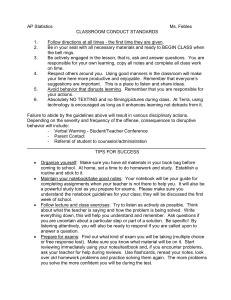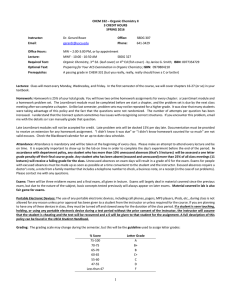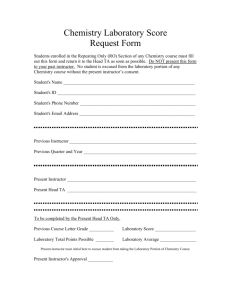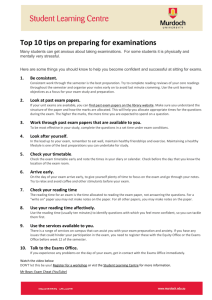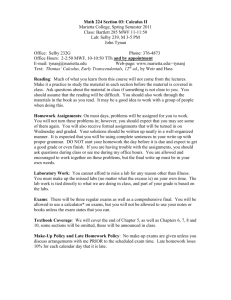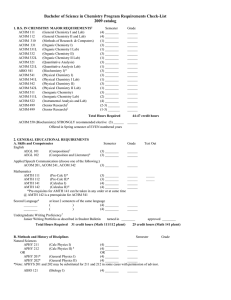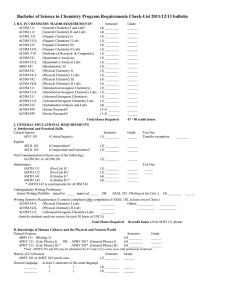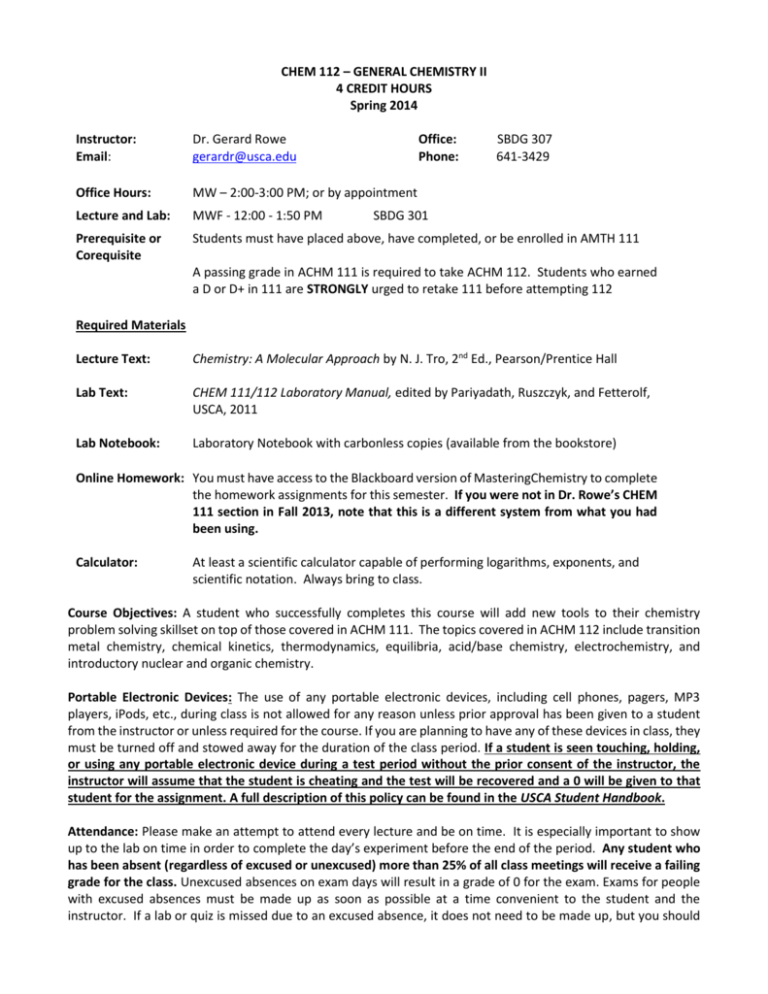
CHEM 112 – GENERAL CHEMISTRY II
4 CREDIT HOURS
Spring 2014
Instructor:
Email:
Dr. Gerard Rowe
gerardr@usca.edu
Office:
Phone:
SBDG 307
641-3429
Office Hours:
MW – 2:00-3:00 PM; or by appointment
Lecture and Lab:
MWF - 12:00 - 1:50 PM
Prerequisite or
Corequisite
Students must have placed above, have completed, or be enrolled in AMTH 111
SBDG 301
A passing grade in ACHM 111 is required to take ACHM 112. Students who earned
a D or D+ in 111 are STRONGLY urged to retake 111 before attempting 112
Required Materials
Lecture Text:
Chemistry: A Molecular Approach by N. J. Tro, 2nd Ed., Pearson/Prentice Hall
Lab Text:
CHEM 111/112 Laboratory Manual, edited by Pariyadath, Ruszczyk, and Fetterolf,
USCA, 2011
Lab Notebook:
Laboratory Notebook with carbonless copies (available from the bookstore)
Online Homework: You must have access to the Blackboard version of MasteringChemistry to complete
the homework assignments for this semester. If you were not in Dr. Rowe’s CHEM
111 section in Fall 2013, note that this is a different system from what you had
been using.
Calculator:
At least a scientific calculator capable of performing logarithms, exponents, and
scientific notation. Always bring to class.
Course Objectives: A student who successfully completes this course will add new tools to their chemistry
problem solving skillset on top of those covered in ACHM 111. The topics covered in ACHM 112 include transition
metal chemistry, chemical kinetics, thermodynamics, equilibria, acid/base chemistry, electrochemistry, and
introductory nuclear and organic chemistry.
Portable Electronic Devices: The use of any portable electronic devices, including cell phones, pagers, MP3
players, iPods, etc., during class is not allowed for any reason unless prior approval has been given to a student
from the instructor or unless required for the course. If you are planning to have any of these devices in class, they
must be turned off and stowed away for the duration of the class period. If a student is seen touching, holding,
or using any portable electronic device during a test period without the prior consent of the instructor, the
instructor will assume that the student is cheating and the test will be recovered and a 0 will be given to that
student for the assignment. A full description of this policy can be found in the USCA Student Handbook.
Attendance: Please make an attempt to attend every lecture and be on time. It is especially important to show
up to the lab on time in order to complete the day’s experiment before the end of the period. Any student who
has been absent (regardless of excused or unexcused) more than 25% of all class meetings will receive a failing
grade for the class. Unexcused absences on exam days will result in a grade of 0 for the exam. Exams for people
with excused absences must be made up as soon as possible at a time convenient to the student and the
instructor. If a lab or quiz is missed due to an excused absence, it does not need to be made up, but you should
attempt to take the quiz early if you know you will be missing class. Excused absences require a doctor’s note, a
note from a family member that includes a telephone number to check, a business note, or a receipt (in the case
of car problems). Please contact me with any questions.
Student Athlete Policy: If you know that you will miss a quiz or exam due to an away game, see me beforehand
to arrange to take the quiz or exam before departure. At the beginning of the semester, I will need a schedule of
away games and tournaments signed by the coach.
Homework: Homework is assigned for each chapter, and must be completed before the next class meeting after
that chapter is finished. I strongly encourage you to divide the homework up into pieces so that you are not racing
to finish the assignments the night before they are due. You are responsible for checking the online system for
due dates and completing the homework on time. Homework constitutes 10% of your final grade, so please take
it seriously. No points will be deducted for wrong answers in the homework, but you must complete each problem
for full credit.
Quizzes and Exams: There will be a quiz on Friday of nearly every week except when there is a major exam that
day. There will be three such exams and a final exam, all given in class. The final exam will be the ACS General
Chemistry Test. Exams will largely deal in material covered since the previous exam, but due to the nature of the
subject, concepts tested previously are likely to appear on later exams. All exams will have an extra credit problem
that uses concepts we learned in class in a way that you have not seen before.
Important note: Students are often shocked when they get their first exam back in this course and find that
they did not get a score that (to their eyes) even vaguely resembles a passing score. My exams are challenging,
and the average score is usually around a 60%. As explained below in the grading section, I have not set a
hard letter grade scale, so I cannot say for sure what a passing score is (or what score will net an “A”) when
the semester starts. After every exam, I will post a histogram that shows the point distribution for the class,
and the average score will always be given when your score is posted on Blackboard, which is useful in
assessing your performance.
Laboratory Exercises: Each lab activity will take from 20 to 60 minutes to complete, and will be related to a topic
discussed in lecture. You will work with a partner for experiments, and will stay with that person for the entire
semester. YOU MAY ONLY WRITE IN YOUR LAB NOTEBOOK WHILE YOU ARE IN LAB!
Prelab Assignment: Instead of submitting a written prelab on the day of a lab exercise, for most labs, you will be
completing an assignment on Blackboard prior to coming to class on a lab day. In addition, in contrast to last
semester, you are now expected to construct your own data tables instead of using one provided in the lab manual
(because they’re not there anymore).
Lab Write-up
Every piece of information relevant to your lab work must be recorded in the lab book. The results of the
experiment will be discussed in the lecture room when the lab is finished. The lab write-up is due in lecture the
next time class meets. You will turn in your lab notebook pages for that experiment, along with any calculations
that needed to be done. Like the pre-lab, the write-up should include:
1) Your Name/Your Partner’s Name(s)
2) Date
3) Experiment Title
4) Data
5) Sample Calculations for EVERYTHING
6) Graphs (If applicable. If done on computer, they may be pasted or taped into the notebook page)
7) A one or two sentence conclusion that states your results and explains how they tie into the concepts
we learned in lecture. If you got the wrong answer, explain the source of that error.
The write-up is worth 3 points, and the conclusion is always worth 1 points. A late write-up can receive a
maximum of 1 point.
Academic Honesty: For all quizzes, exams, labs, and homework assignments, The USC Aiken Honor Code is in full
effect. If the instructor has evidence that a student has violated this honor code for a particular assignment, that
student will receive a 0 for that assignment. If that student is caught in violation of the USCA Honor Code
subsequently on a future assignment, that student will receive a failing grade for the course and a letter detailing
and documenting the student’s actions will be sent by the instructor to the Vice Chancellor for Student Life and
Services. Further information about violations of Academic Integrity can be found in the USCA Student Handbook.
You will be asked to sign the Honor Pledge on each examination.
March 8, 2012 is the last day to drop a course or withdraw without receiving a “WF” for Spring 2011.
Grading: Grading will not be done on an absolute scale. Instead, the grades will be assigned with respect to the
class average. Anyone whose final score is equal to the class average will receive a letter grade somewhere
between C+ and B. Generally, the letter grade partitions will be based on the standard deviation from the mean
(e.g., If the class average is 50%, and the stdev is 8%, then a 58% would be a B+ and a 66% would be an A). In past
years, the class average has been around 65%, and the standard deviation about 14 percentage points.
Point Distribution:
Homework
10 quizzes @15 pts ea.
4 exams @100 pts ea.
15 Labs @ 6 pts ea.
Final exam (ACS)
Total
= 88
=150
=400
= 90
=150
=875
10%
17%
46%
10%
17%
100%
Disability Statement: If you have a physical, psychological, and/or learning disability which might affect your
performance in this class, please contact the Office of Disability Services, 126A B&E, (803) 641-3609, as soon as
possible. The Disability Services Office will determine appropriate accommodations based on medical
documentation.
Course Calendar: The course calendar is posted on Blackboard in the “Course Announcements” section.
471 University Parkway • Aiken, SC 29801
803-648-6851 • 1-888-WOW-USCA
Copyright © 2004 by the Board of Trustees of the University of South Carolina.
http://www.usca.edu

